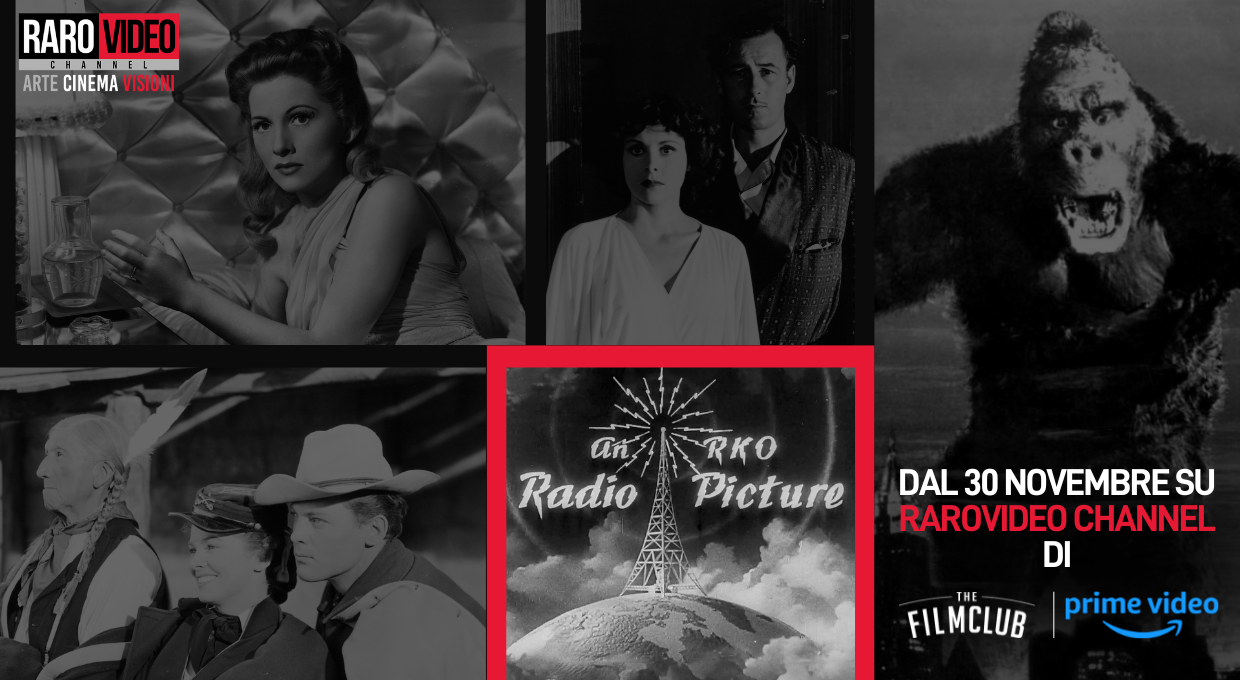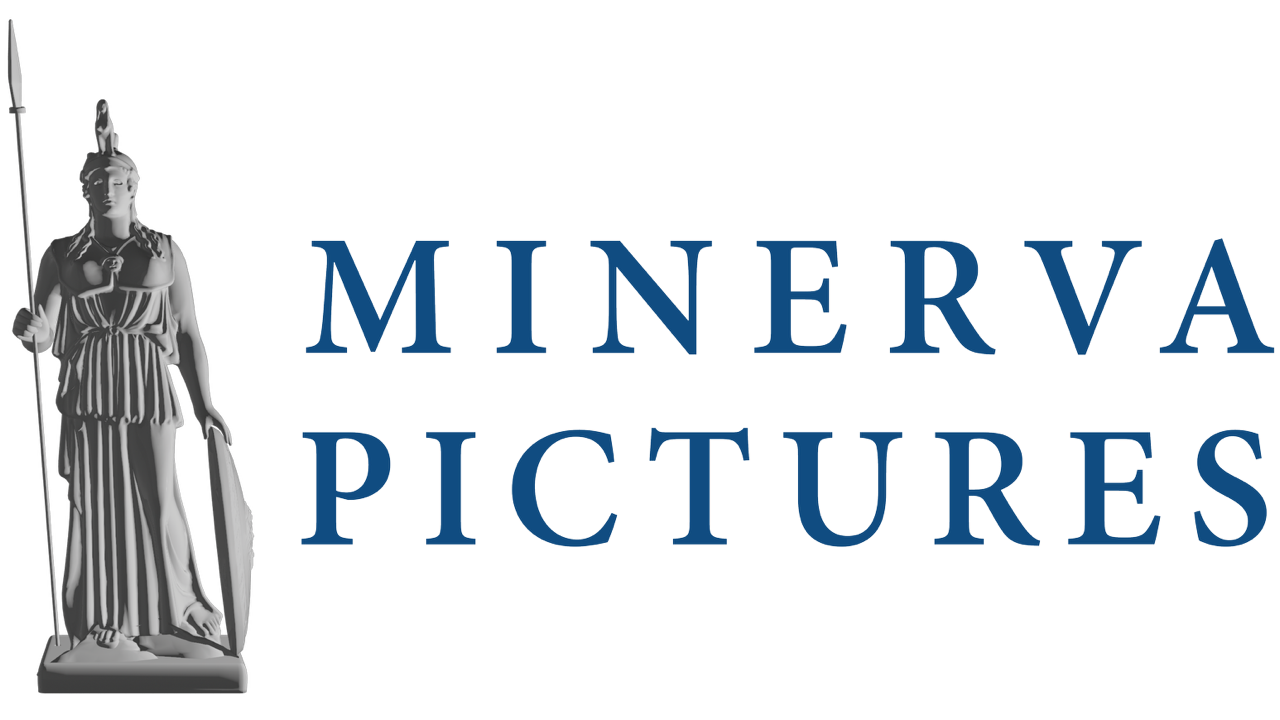Minerva Pictures brings the iconic catalog of the renowned major studio RKO Pictures to Rarovideo Channel on Prime Video and The Film Club!
4 December 2023
Minerva Pictures, in collaboration with Rarovideo Channel on Prime Video and The Film Club, starting from November 30th, will bring the iconic catalog of RKO Pictures to Italy. RKO Pictures, the illustrious American film production and distribution company that, between the 1930s and 1950s, produced films featuring artists such as Katharine Hepburn, Fred Astaire & Ginger Rogers, Cary Grant, Alfred Hitchcock, Orson Welles, and John Ford, becoming one of the Big Five in the Hollywood studio system. Over fifty titles will be introduced for the first time in Italy as part of a unique RKO-branded collection!
The collection will bring to Italy some of the milestones of golden Hollywood. Leading this extraordinary selection is King Kong (1933), directed by Merian C. Cooper and Ernest B. Schoedsack. One of the films that significantly shaped the collective imagination of cinema history, a paradigm of a highly recognizable visual language, revisited through numerous sequels and remakes over the decades. The film was selected for preservation in the National Film Registry of the Library of Congress of the United States, and the American Film Institute ranked it 41st in the list of the greatest American films of all time.
“Incapable of singing, acting, and even dancing.” Legend has it that these were the impressions producers at RKO had when auditioning Fred Astaire. However, everything changed with the meeting with Ginger Rogers, with whom Astaire established one of the most iconic artistic collaborations in the seventh art. Six out of ten musicals from the Fred Astaire-Ginger Rogers duo became the highest-grossing films for the American major studio. On Rarovideo Channel, the five most famous films of the duo directed by Mark Sandrich will be showcased: The Gay Divorcee (1934), the second film featuring Astaire and Rogers but the first as lead roles, honored with the Oscar for Best Song. A similar fate befell Swing Time (1936), directed by George Stevens, which won an Oscar for the song “The Way You Look Tonight.” Top Hat (1935), the highest-grossing film of that year, is considered one of the best musicals in cinema history, featuring music by Irving Berlin (who can forget “Cheek to Cheek”?), one of the greatest composers of the 20th century. And then, Follow the Fleet (1936), Shall We Dance (1937), and The Story of Vernon and Irene Castle (1939).
Thrills are served in grand style in the Minerva Pictures and RKO proposal. It begins with Alfred Hitchcock‘s Suspicion (1941), a masterpiece that revolutionized Cary Grant‘s image, transforming him from the reassuring face of comedy to a darkly handsome figure in noir tones. The film received four Oscar nominations, and Joan Fontaine won the Oscar for Best Actress.
Next, we delve into the great classics of horror with Cat People (1942) and I Walked with a Zombie (1943) by Jacques Tourneur. The former, with Roy Webb‘s soundtrack, was selected for preservation in the National Film Registry for its cultural, historical, and aesthetic significance and is one of the first films to use jump scares. The latter was an absolute precursor in the cinematic representation of zombies, a horror iconography later made cult by George Romero in 1968. Also coming from Tourneur is Berlin Express (1948), a suspenseful spy story set against the backdrop of post-war Germany, and Out of the Past (1947), considered one of the most successful film noirs ever.
Paying homage to the horror sci-fi genre, The Thing from Another World (1951), directed by Christian Nyby, considered a classic of 1950s science fiction cinema.
On the frontiers of the Wild West, amidst vintage spirits, dust, and spurs, we have the must-see films directed by John Ford, including The Fugitive (1947), starring Henry Fonda, which won the International Award at the 9th Venice Film Festival, and Wagon Master (1950). Following are two titles from the iconic trilogy about the U.S. cavalry by the director: Fort Apache (1948), featuring John Wayne, Henry Fonda, and Shirley Temple, and She Wore a Yellow Ribbon (1949), with John Wayne, which won the Oscar for Best Cinematography in Color in 1950 and is considered one of Ford’s visually most important films.
Furthermore, Nicholas Ray‘s They Live by Night (1948), the most significant precursor to the “lovers on the run” genre, a film noir with sentimental undertones. According to Cahiers du cinéma, They Live by Night anticipates the profound changes that American cinema would soon undergo in the transition from classical to modern narrative cinema.
Also arriving is Blood on the Moon (1948) by Robert Wise, the first example of a noir Western, Of Human Bondage (1934) by John Cromwell, with Bette Davis in the role that definitively propelled her to success, and Bringing Up Baby (1938) by Howard Hawks, starring Katharine Hepburn and Cary Grant, considered one of the greatest American comedies of all time.
For the most dedicated cinephiles, the schedule includes Deluge (1933) by Felix E. Feist, a post-apocalyptic science fiction film and one of the earliest and rarest examples of a disaster movie, as well as some extremely rare pre-Code films (1930-34), the most controversial five years in Hollywood history.
To enrich the selection of award-winning titles, None but the Lonely Heart (1944) by Clifford Odets, featuring Cary Grant, nominated for four Oscars and winner of the Oscar for Best Supporting Actress, Springtime in the Rockies (1947) by Irving Reis, honored with the Oscar for Best Original Screenplay, Kitty Foyle (1940) by Sam Wood and starring Ginger Rogers, who won the Oscar for Best Actress, Crossfire (1947) by Edward Dmytryk, winner of the Best Social Film award at the second Cannes Film Festival and nominated for five Oscars, and The Sea Around Us (1953) by Irwin Allen, awarded the Oscar for Best Documentary.
These and many other titles, over 50 in total, form an unmissable catalog that traces the history of classical and contemporary cinema, presented for the first time in Italy as a unique collection.
But it doesn’t end here! In the weeks to come, three additional Rarovideo Channel offerings will join the legendary RKO titles: My American Uncle (1980) by Alain Resnais, winner of the Special Jury Grand Prix at the 33rd Cannes Film Festival, Rendez-vous (1985) directed by André Téchiné, awarded for Best Director at the 38th Cannes Film Festival, and, in conclusion, The Birth of a Nation (1915), the mythical and controversial silent film directed by D.W. Griffith, ranked 44th in the list of the top 100 American films and among the highest-grossing films in cinema history.
From November 30th, the golden age of Hollywood awaits you on Rarovideo Channel on Prime Video and The Film Club, the best boutique for auteur, experimental, and rare cinema!
